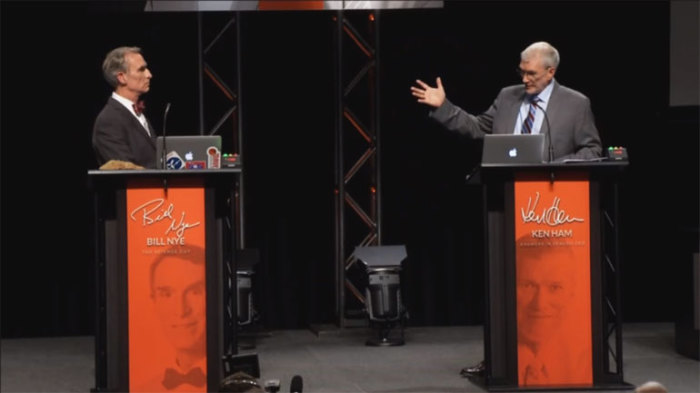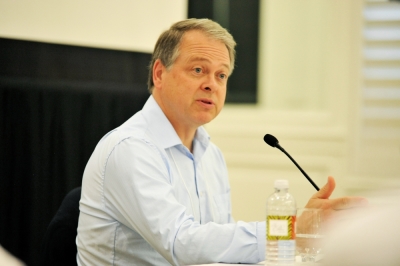Forget Evolution vs Creation, There Are (At Least) 6 Different Views, Evangelical Biophysicist Explains

MIAMI BEACH — Media coverage of debates over the Bible, the origin of life and God can mischaracterize many people by suggesting there are only two sides — creationists and evolutionists. There are at least six different overlapping categories, according to professor Jeff Hardin, an evangelical biophysicist and chair of the zoology department at the University of Wisconsin-Madison.
Those different views are based upon whether the supernatural is possible and the extent to which one believes science is in conflict with the Bible, Hardin explained for a Nov. 18 lecture hosted by the Ethics & Public Policy Center's "Faith Angle Forum."

The Faith Angle Forum treats journalists from across the country to in-depth discussions from experts on issues related to religious belief. (A transcript and audio of Hardin's talk is available here. You can also watch a profile of the Faith Angle Forum by ABC News here.)
Strictly speaking, all Christians and most non-Christians are creationists, Hardin pointed out, because a creationist simply believes that the universe was created by an intelligent being. The belief that scientific methods can be used to understand the natural world, is what Hardin calls "methodological naturalism."
There is no inherent conflict between creationism and methodological naturalism. Believing both are true simply means believing that an intelligent being created the natural world and scientific methods can be used to understand the natural world.
Methodological naturalism is distinct, however, from "metaphysical naturalism," or the belief that the natural world is all that exists and there is no such thing as the supernatural. Though proponents of metaphysical naturalism sometimes present their views as based upon science, metaphysical naturalism is actually a "worldview or a philosophical commitment" and "no longer a natural explanation," Hardin said.

Since science is used to understand the natural world, it's inadequate for understanding what might exist outside the natural world or for answering questions unrelated to the natural world. Science is "spectacularly successful, but its success lies in the self-limitation of its methodology," Hardin said.
Among the creationists who are Christian, there are some differences based upon the degree to which they view science in conflict with or complementary to the Bible. Rather than distinct views, Hardin believes the differences can be thought of as lying across a spectrum, from a view that evolution is wrong or incomplete to the view that evolution accurately describes the natural world but is not incompatible with Scripture.
Young Earth Creationists, often typified by Answers in Genesis founder Ken Ham, interpret the creation story in Genesis to mean that the Earth was created in 144 literal hours. Young Earth Creationists believe some scientific findings, such as the theory of evolution, are inconsistent with their interpretation of Scripture, and Scripture is more reliable than science.
Evolutionary Creationists are at the other end of the spectrum. (Hardin counts himself among them.) They remain committed to the authority of Scripture but do not believe that commitment requires them to abandon modern scientific evidence for the theory of evolution. Quoting Francis Bacon's take on Psalm 19 ("Let no person think or maintain that they can search too far or be too well studied in the book of God's Word or the book of God's works."), Hardin said Evolutionary Creationists take a "two books approach." They study the Bible (God's Word) and they study nature (the book of God's works).
Between and among the Young Earth Creationists/Evolutionary Creationists spectrum lies Day Age or Progressive Creationism and Intelligent Design.
Progressive Creationists, typified by astrophysicist Hugh Ross, believe in an old Earth and attempt to find harmony between biblical accounts and modern science. Though it was published after Hardin's talk, a recent Wall Street Journal op-ed by Eric Metaxas that has generated much debate would be another example.
Intelligent Design is the belief that certain features of the natural world can only be explained by an intelligent cause. Proponents of this view include Michael Behe and Phillip Johnson. Intelligent Design is presented as an alternative to evolutionary theory, but has not produced testable hypotheses or alternatives to methodological naturalism. Proponents acknowledge these weaknesses but argue their work is still young and those challenges will be overcome.
While Young Earth Creationists and Metaphysical Naturalists represent only a small part of these diverse views, they often get the most attention. Last February, for instance, there was an evolution debate between Ham and celebrity scientist Bill Nye that received much media attention.
Hardin believes that one of the reasons many Evangelicals have difficulty accepting evolution is that they have bought into the notion, promoted by Metaphysical Naturalists like atheist Richard Dawkins, that a belief in evolution requires disbelief in a creator. Evangelicals, Hardin said, look to people like Dawkins and decide, "I can't accept that, so therefore I cannot accept thinking at all about evolutionary biology."
Indeed, Hardin pointed to anecdotal evidence and survey data in his talk showing that Evangelicals do not reject science. Per capita, Evangelicals have taken more science classes that other types of students.
But, Evangelicals who have graduated from college are more likely to reject evolution than Evangelicals who've not graduated from college. Citing the work of John Evans, a University of California-San Diego sociologist, Hardin concluded that Evangelicals do not have a problem with science but with scientists. In other words, Evangelicals trust science but believe scientists are biased in how they present their findings.
Changing how Evangelicals view science, Hardin concluded, "is likely more about allaying theological concerns for the faithful than about imparting information. And attitudes about science may be as much about social and relational considerations as they are about information."
Hardin, who also has a masters of divinity degree from an Evangelical seminary, does not believe that the different views Evangelicals have about science and evolution should divide them on their core commitments.
"It's not about who's right and who's wrong, who we can beat down, who we can win against," Hardin said, "but who we can invite into a conversation, and during that conversation making sure that we do well by the text of Scripture, that first book, and that second book, the book of God's world."




























